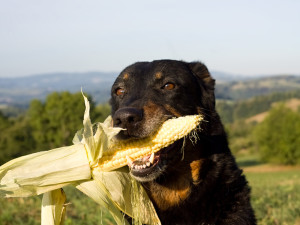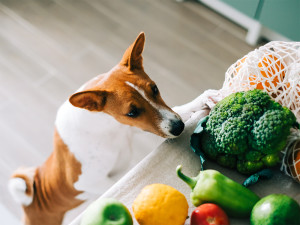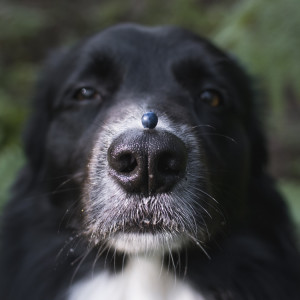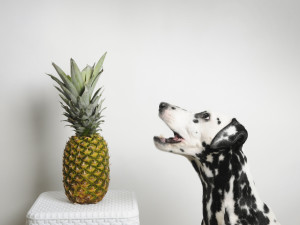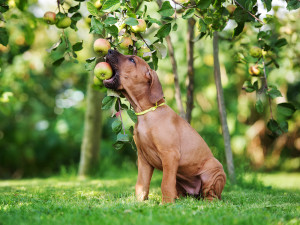Many dogs love to snack on sweet, juicy fruits, and mangos are no exception. But are mangos safe for dogs to eat? They can be, with some exceptions. Find out about the nutritional benefits of the “King of fruits” and the best ways to feed mango to your dog.
Nutrition facts: mango for dogs
Mangos (Mangifera indica) contain an abundance of vitamins and nutrients that are beneficial for dogs. Mangos also have a lot of fiber and water, which help promote gut health. Nutritional benefits of mangos for dogs include:
Packed with Vitamin C: Vitamin C is an important antioxidant that boosts immune function and aids in the healing process.
Rich in antioxidants: Mangos are rich in compounds called polyphenols, which act as free radical scavengers and help safeguard cells from potential damage.
Lots of Vitamin A: Vitamin A is important for immune function, vision, and growth.
A good source of folate: Folate (Vitamin B9) plays an important role in red blood cell formation and cellular function
Lots of fiber: Dietary fiber helps dogs have healthy, regular bowel movements and maintain a balanced gut flora.
Is mango good for dogs?
Mangos can serve as a healthy snack for dogs, as long as they can handle the extra sugar. Most dogs can enjoy the occasional mango snack and reap the benefits of extra vitamins and antioxidants, but dogs with diabetes may not be able to handle this sweet fruit.
Can dogs eat mango seeds?
Don’t feed a dog mango seeds. Mango seeds are difficult to digest and will likely cause a problem before even beginning to be broken down. Ingested mango seeds can be a choking hazard and carry the risk of causing gastrointestinal obstruction in dogs. Signs of GI obstruction in dogs include vomiting, inappetence, abdominal pain, and lethargy. Mango seeds also contain cyanide compounds, which are toxic to dogs. The amount of cyanide in a single mango seed is unlikely to cause a severe toxicity, but why risk it?
How much do you spend on your pet per year?
Can dogs eat mango skin?
Mango skin is technically edible, but you should avoid feeding mango skin to dogs. The skin is difficult to digest and large pieces can get stuck in a dog’s esophagus or intestines. Mango skin (and other parts of the mango plant) also contains urushiol, an oily substance that can cause skin irritation. Fun fact: this is the same substance found in poison ivy. Dogs don’t really get poison ivy dermatitis, though. A dog who runs through poison ivy and then rubs against their parent is more likely to give their parent dermatitis than develop dermatitis themselves. That being said, it’s best to remove any potential irritants before feeding mangos.
Are mangos completely safe for dogs?
Mangos are not toxic to dogs, but that doesn’t mean that they are risk-free. Mango seeds and skin are difficult to digest and can be a choking hazard. They can also get stuck in a dog’s intestines. A high sugar content makes mangos an unsuitable snack for dogs with diabetes or conditions where sugar and calories should be limited.
How to feed mango to a dog
When offering a dog mango, dog parents should take steps to minimize any risk associated with the fruit. First, stick to feeding the flesh — remove the seed and skin. Cut the flesh into bite-sized pieces and limit servings to the occasional small snack. If your dog loves cold treats, especially in the warmer months, consider freezing small cubes of mango for your dog. If your dog has diabetes, skip this snack and choose something that has less sugar.
The bottom line: Can dogs eat human food?
There are plenty of fruits that are safe for dogs, including mangos. Dogs, like people, can develop a sweet tooth, so be sure to offer veggies or other low-sugar snacks. Too much fruit (i.e. too much sugar) can contribute to obesity, increase risk for diabetes, and promote tooth decay. Any new food or treat can cause stomach upset, so human foods should be fed in moderation. Follow the 10 percent rule: treats should not make up more than 10 percent of a dog’s diet.
Other fruits that are safe for dogs
Watermelon: Watermelon is a water-rich, hydrating snack that many dogs enjoy. It’s safe to feed your dog watermelon as long as you remove the seeds and rinds first. Watermelon contains lots of vitamins and minerals, but also lots of sugar, so it should be fed in moderation.
Blueberry: Blueberries are loaded with antioxidants like Vitamin C that can help boost a pup’s immune health. These bite-sized treats can be used for training or just for fun summertime snacks.
Cantaloupe: Cantaloupe is rich in Vitamins A and C. This melon also has lots of fiber which is great for digestive health. This sweet melon can be fed to dogs in moderation. Always remove the rind before offering cantaloupe to a dog. The rind can cause choking or intestinal obstruction.
Other fruits that are dangerous for dogs
Grapes: Grapes and raisins are toxic to dogs. Tartaric acid in grapes can cause acute kidney failure and gastrointestinal upset in dogs. Dog parents should also be mindful to avoid foods that may contain raisins like bread, cookies, and trail mix.
Oranges: Orange peels are toxic to dogs. Any part of the citrus plant that contains essential oils can cause vomiting and diarrhea in dogs. Orange flesh is technically okay for dogs to eat, but most dogs won’t like it.
Avocados: Avocados contain a substance called persin, which can cause vomiting and diarrhea in dogs. Avocado pulp has a high fat content and can cause pancreatitis in some dogs. Like mango seeds, avocado pits are a potential choking hazard and can cause intestinal obstruction in dogs.
FAQs (People also ask)
Are mangos toxic to dogs?
Mangos are not toxic to dogs, but they do have a high sugar content and should be avoided in diabetic dogs. Mango skin and seeds should not be fed to dogs due to risk of choking and GI obstruction. Mango seeds also contain small amounts of cyanide.
Can dogs eat dried mango?
Dried mangos have a higher sugar content than fresh mangos. Store-bought dried mangos may also have added preservatives. If feeding your dog mangos, stick to feeding fresh fruit.


